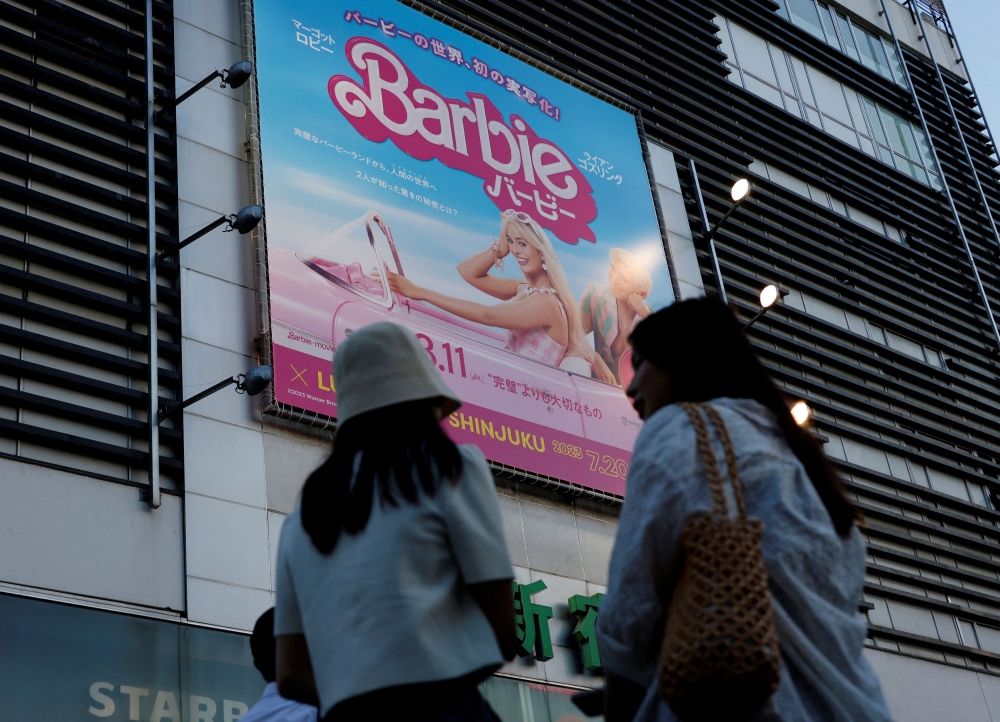AUG 27 — "Barbenheimer" has become such a catchphrase and pop culture phenomenon that you simply cannot escape bumping into it throughout this summer blockbuster season.
And the numbers don’t lie, as "Barbenheimer" has now grossed over US$2 billion (RM9.2 billion) at the box-office worldwide, with Barbie collecting almost US$1.3 billion and Oppenheimer bringing in over US$720 million to date.

Expect these numbers to continue to grow as both films are still playing in cinemas all over the world, despite the plethora of new releases coming into play ever since their cinema debuts last month.
At first, even I thought that doing a double review of Barbie and Oppenheimer would be a good idea, since the media machine has been touting this battle ever since it first came to light that both movies will be released on the same date throughout the world, but after seeing both films and having been completely won over by Barbie, I think it deserves its own piece, no offense to Christopher Nolan and Oppenheimer, which I also liked a lot.
One of the most fascinating things about filmmaking for me is how subversive an act it can be, even in the most mainstream of film forms.
Even more amazing is if a film can be enjoyed both ways – as a capitalist piece of mainstream entertainment and a subversive allegory.
This is where I think Barbie ultimately triumphs in the "Barbenheimer" war, it has so many layers and will inspire so many readings that the more grounded, subtle and straightforward story being told in Oppenheimer simply can’t help but feel modest in comparison.
So, what are these layers then? Since it’s been more than a month since the film’s release on July 20, 2023, and I’m sure most of you, dear readers, have seen it, I guess it’s okay to go into more detail about the film’s plot, because I’d need to do that to talk about these layers. So, spoiler alert then if you still haven’t seen it!
On the surface, Barbie looks and feels like your typical female empowerment film. Margot Robbie plays the titular Barbie character, or more specifically the Stereotypical Barbie, who lives a perfect life in Barbie Land, where women hold all the high-powered jobs, from president to doctor to physicist to lawyer and even the Nobel Prize winners are all women (and they’re all called Barbie, of course).
All the men here are called Ken, and seem to exist only to woo and be the companion to their own respective Barbies.
If you tend to only read things literally, you’ll no doubt dismiss this as too obviously hammering home the message for female empowerment/feminism.
But even from the start, director Greta Gerwig and co-writer Noah Baumbach have slipped in plenty of signals that there’s a bit more cheekiness here and that there’s more than meets the eye, what with that blatant homage to 2001: A Space Odyssey in the film’s intro and trailer, and that cheeky throwaway opening narration by Helen Mirren in which she said “Thanks to Barbie, all problems of feminism and equal rights have been solved.”
Look just a little bit deeper, and you’ll realise that this movie is actually about the Ken character that’s played by Ryan Gosling.
And once you realise that, you’ll also start to notice that there’s a smartly conceived allegory going on here, and the female experience/point of view is actually represented by Ken instead of Barbie because things are totally reversed in Barbie Land, so instead of the patriarchy we’re experiencing in the real world now, it’s a matriarchy that rules Barbie Land, with the same imbalance of power and under/non-representation that happens here in the real world.
So, when the film’s plot puts Barbie and Ken in the real world for a short while, and Ken discovers the wonders of patriarchy, he then attempts to reverse that imbalance of power by attempting to brainwash all the Barbies and take over Barbie Land, turning it into a Ken-dom.
Now imagine this, if Ken was a woman, doing this in the real world, we’d probably call him a radical feminist, wouldn’t we?
What Gerwig and Baumbach have cleverly concocted here is to set up a situation where both patriarchy and feminism are open to be satirised in merciless, equal measure.
And as if this allegory/layer to the film is not clear enough, we get two passages of dialogue that very clearly signals that this allegory/layer is definitely on Gerwig and Baumbach’s minds when they wrote this.
The first comes after patriarchy has successfully taken over Barbie Land, when Ken has taken over and now uses Barbie’s house to party with his friends and ignores Barbie (recalling a similar scene when Barbie does the same and ignores Ken during the film’s first act), and then saying to her, “It doesn’t feel very nice, does it?”
The second one comes towards the end of the film when Ken confesses to Barbie that he doesn’t know what he’ll be without her because his whole existence is based on the concept of “Barbie and Ken”, which surely will bring to mind the concept of “Adam and Eve.”
It’s a sharp little reversal that one can clearly interpret and read as such, such is the brilliance and clarity of the film’s conception.
Of course, a literal reading of the film will say that this is a movie about female empowerment against the patriarchy, the tone-deaf nature of the men’s rights movement and the fragility of the male ego, but substitute those with matriarchy, radical feminism and a woman’s place in the world, and the film would still work just as well.
And I’m pretty sure that there are many other different interpretations of the film out there too.
If that is not a sign of a well-conceived and brilliantly executed film, then I don’t know what is.
*This is the personal opinion of the columnist.






















